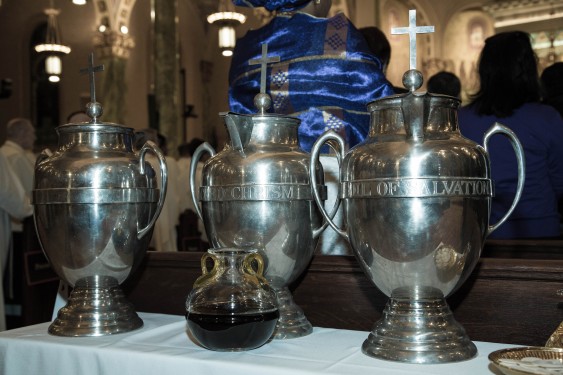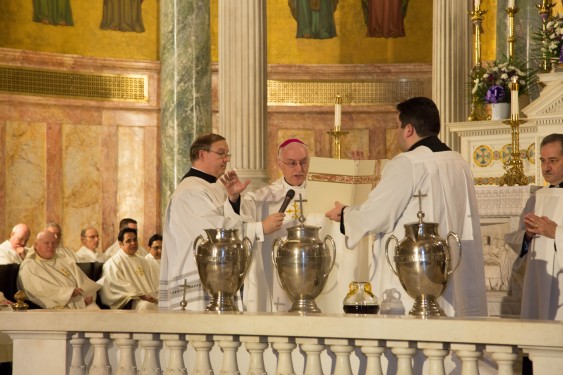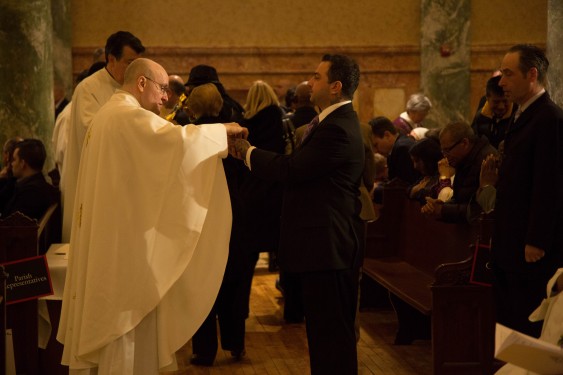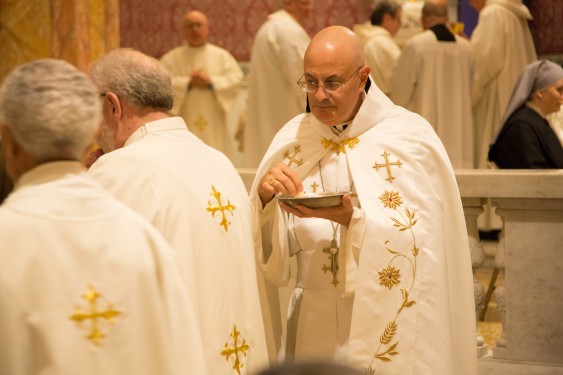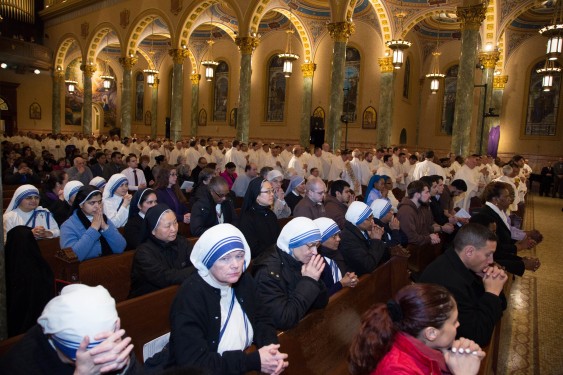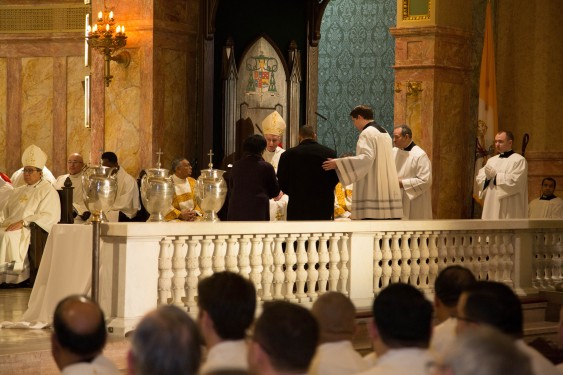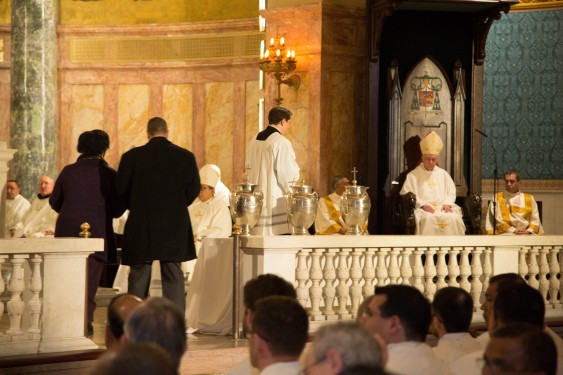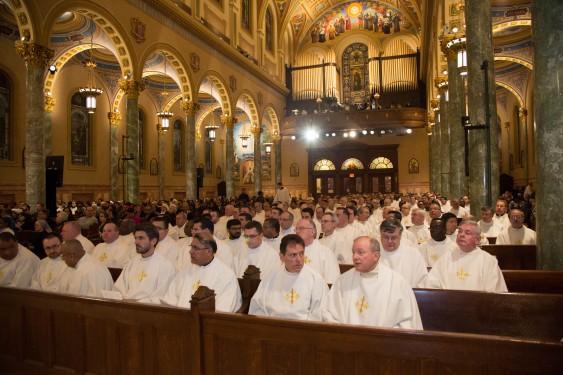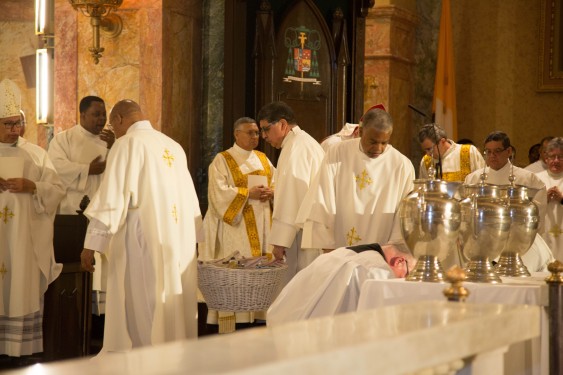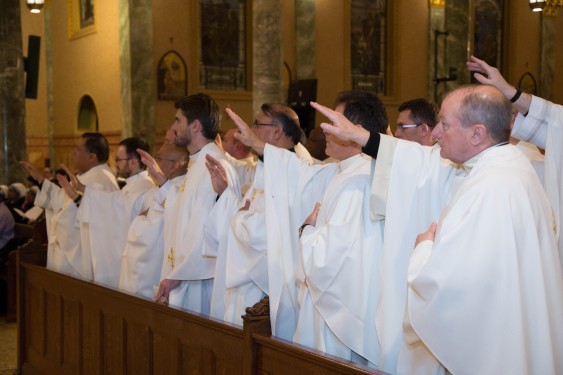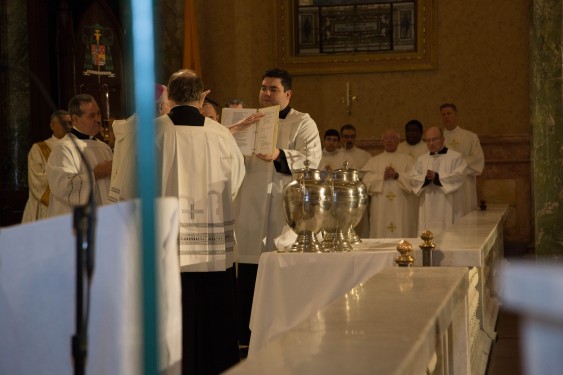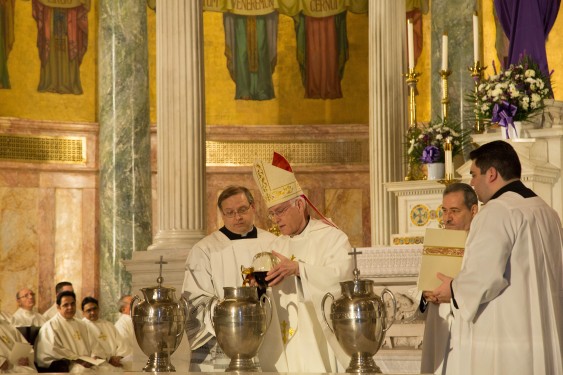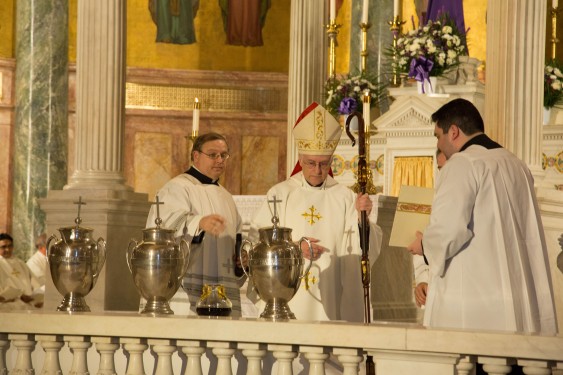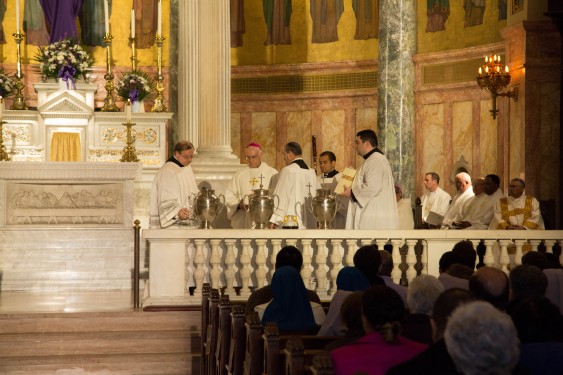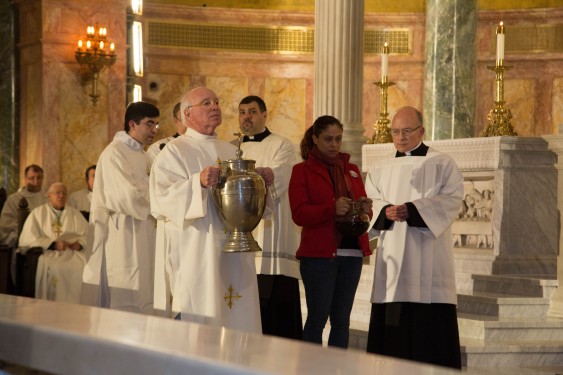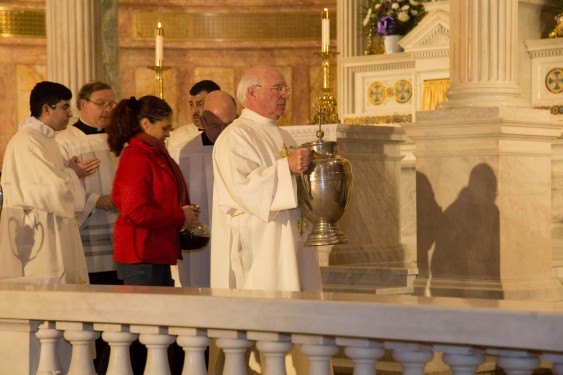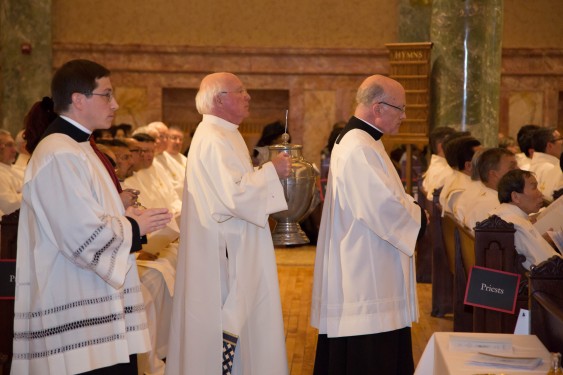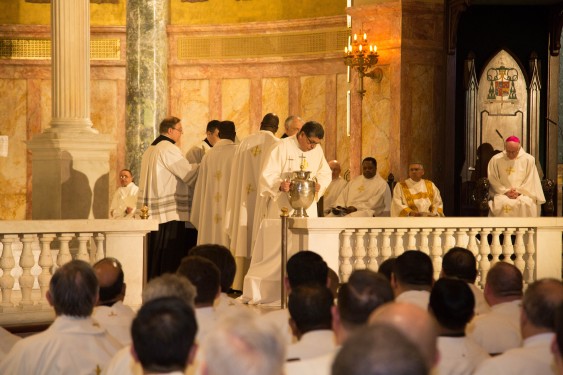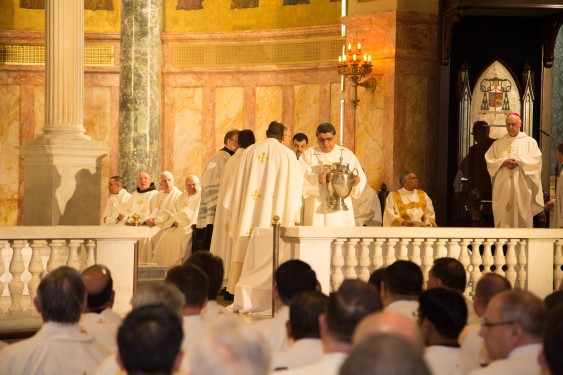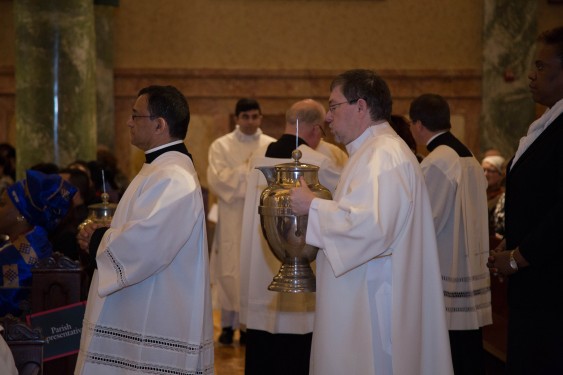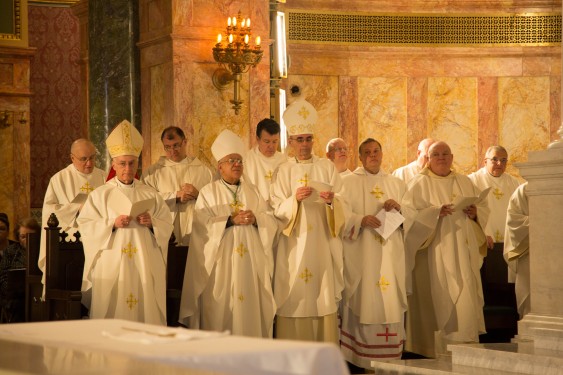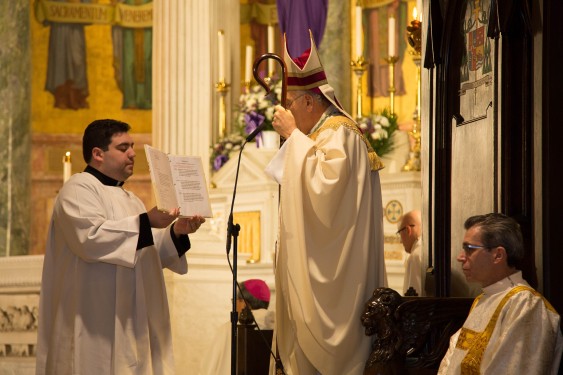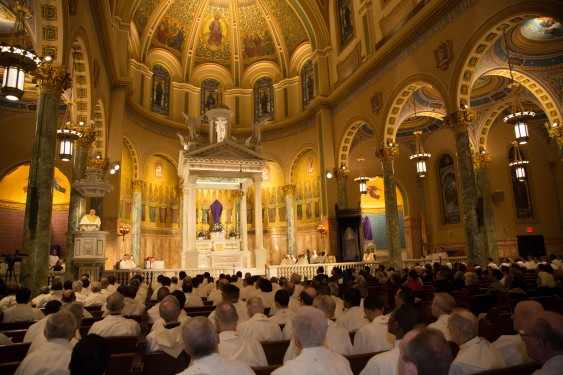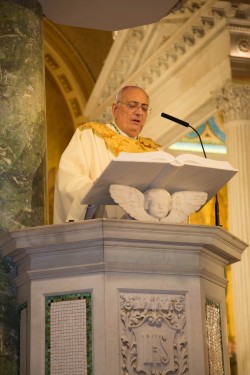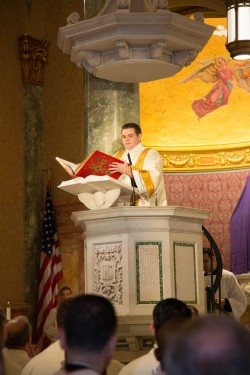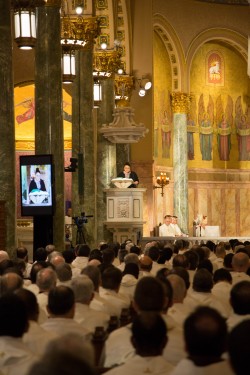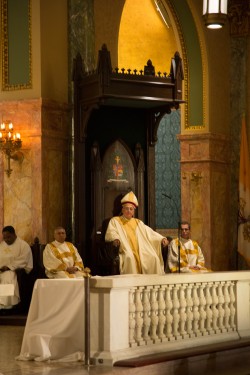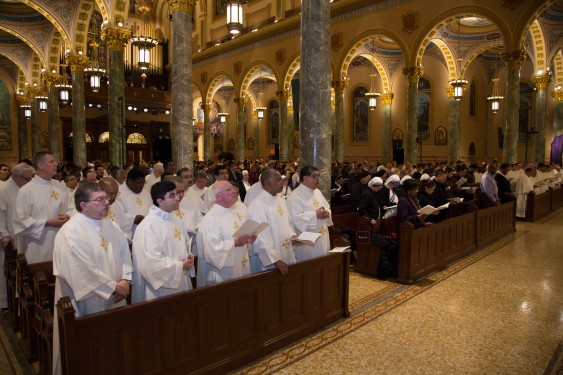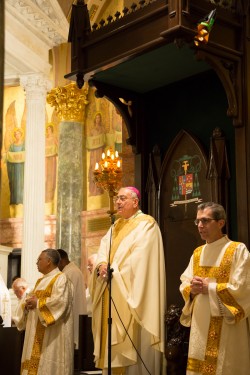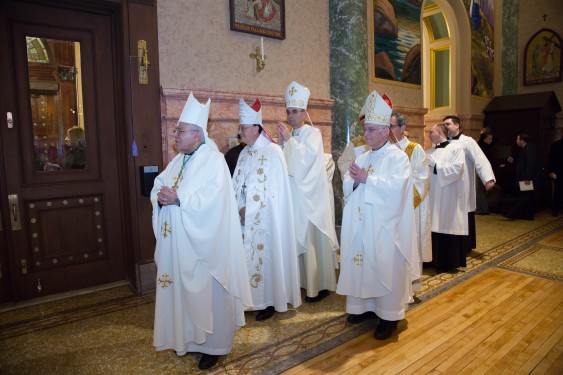This is the complete text of Bishop DiMarzio’s homily at the Chrism Mass, March 31, at St. Joseph’s Co-Cathedral, Prospect Heights:
My dear brothers and sisters in the Lord,
Tonight, in this Mass of Chrism, we bless the oils used for the administration of the sacraments and recommit ourselves to priestly and diaconal service, which means the service of the Word and the sacraments for the benefit of all of God’s people.
The Gospel tonight of Jesus’s first sermon in the synagogue of Nazareth, ends with the words, “Today this Scripture is fulfilled in your hearing” as at every Eucharist when the word leads us to the sacrament of the living Word, Jesus Christ, who is anointed with the Spirit.
Tonight, I wish to speak to you priests, deacons and religious and lay faithful as preachers and hearers about the sermon or homily.
[Photos by Robert Longo]Our Holy Father, Pope Francis, in his Apostolic Exhortation, “The Joy of the Gospel,” and more recently, in 2014 the Congregation for Divine Worship and the Discipline of the Sacraments issued its Homiletic Directory, has given us good advice on how to make a homily effective for both preachers and hearers.
Pope Francis says a homily is a dialogue between God and His people (137), that it cannot be a form of entertainment (138), and not too long (138). Or, like the old adage, a sermon should have a beginning and an end, and not too much in the middle. It should be like a mother’s conversation with her children (139) and contain words that set hearts on fire (144). Perhaps like the old African-American preachers who said, “If there is ice in the pulpit, there will be no fire in the pews.”
Preaching has effects, first of all on the preacher and then an effect on those who listen in the congregation. Scripture tells us that God’s Word is effective as it is compared to the rain that comes down and does not return to the sky until it has watered the earth. And so it is with God’s Word. The Word is what is entrusted to us. The Word is all powerful. We are mere instruments of God; we are prophets who speak the Word for God. Not foretelling the future, but in effect presenting the Word of God for the present. We are mediators and the Word of God passes through us to the people who listen. In order to be an effective preacher, we must forget ourselves.
Yes, we must forget ourselves. We must let ourselves go. St. Teresa of Avila once said: “Preachers who do not let go of themselves will never inspire people. They must be like the Apostles who threw all caution to the wind.” When we are self-conscious, we cannot let the Word of God work through us. Forgetting self does not mean that we cannot be personal. We must be personal. However, to be personal does not mean to be self-centered. A homily constantly using the word “I” is a good indication that it is rather self-centered, and the homily will not exude confidence in letting the Word of God speak through us.
Giving a homily is somewhat like being on a stage. The best actors are those who exude confidence and conviction. In a sense, they are able to work out of themselves to take on the character of the person they portray. We are to be Christ to God’s people in preaching the Word. We cannot be self-conscious. We cannot worry about making mistakes. We must let the Word of God work through us. Yes, certainly there is a message to be delivered. It is something truly important that we have to say. It is God’s very word intended for the hearers that it might make a difference in their lives. However, sincerity and authenticity are truly important if we are to preach effectively.
Some authors have compared preaching to telling a story. Yes, each component in the dialogue has a story. The preacher, the story of God’s Word, and the story of each person in the congregation.
But what is a story? A story is not a fairy tale. A story is not invented or made up. A story is not just an ice breaker or an opener for a homily. A story can best be defined in this way, a story in its deepest sense is: “A quest, a search of this particular person or community in history. Story is the narrative symbol of how we have ordered our experiences with a vision.” 1
Yes, each one of us has a story. We have made our lives a living story. If we were to tell another about ourselves, we would tell our story, our origin, our experiences, our successes, our failures, our deepest hopes. All of these are components of our personal story. Obviously, our listeners have the same components in their life stories. But what about the story of God? Yes, the Scriptures are truly God’s story. They are how God reveals Himself to us, with the same components that are a part of our personal story. We just have to make sure that the three stories – our own, that of God and that of the listener – somehow connect. This is an act of true communication.
Stories are opportunities for transformation and challenge, not just tools for moralizing or simply giving examples to the listeners. The Biblical story interprets our own stories and that of the listener. The story shaped in the homily often emerges from the Biblical text itself because it is the revealed story of God’s interaction with His people. The story telling provides almost a checklist for a homily to determine if it contains the story of the preacher, the story of God and the story of the listener.
In “Evangelii Gaudium” (“The Joy of the Gospel”), the Holy Father says that we must preach from the heart: “Where your synthesis is, there lies your heart.”2 The synthesis is the kernel of the Gospel, the pearl that we wish to leave with our hearers. I once heard it said, “Are we trying to deliver a pearl or a necklace?” Remember where pearls come from? They come from clams. A single grain of sand enters a clam and irritates it enough so that a great pearl is formed. That is something like what we should do with a homily. We must irritate people a bit. We must, as it is said, console the afflicted and afflict the comfortable.
We are always reminded, as we hear in First Peter: “If we preach, let it be with the Word of God.” We must preach only God’s Word. Not ourselves, not our story alone. But we must preach our story which can illustrate how we have accepted God’s Word and are a witness to His Word.
First, the preacher is called to be truthful and tell it like it is, understanding the story of the world in which we live and the story of the Scripture. The great theologian Karl Barth said: “We must preach with the Bible in one hand; and a newspaper in the other.” We need to bring together the story of the then to influence the now. It is a difficult task. However, it is the key to effective preaching.
Second, we must be human and not fear our own humanity, but be willing to tell our own story. Sometimes we preach as wounded healers, but always as one faithful to God’s Word. This does not mean to preach about our sins, but failures can be communicated. Obviously, our story must be real and heartfelt, as we must shed light on God’s story and mirror the story of our listeners. We have to talk about life as we know it and have experienced life. This is so that our hearers will not say: “What does this have to do with me?” They will know what it has to do with them.
Finally, we must be interpretive. We need to be almost like doctors, doctors of the soul. We need to diagnose the problems of our listeners. We must understand their origin, their causes, and we must write a prescription. Priests are admonished in the Rite of Ordination that they “Be mature in knowledge and that their doctrine be spiritual medicine for the people of God.” That means that we need to observe the world in which we live. We need to see the causes of evil as we find it in so many ways. And we cannot fix the problem of evil, which is beyond our responsibility. However, we must shed light onto those problems. This is the work of the preacher.
How do we know God’s story? How can we proclaim the Good News? In “The Joy of the Gospel,” Pope Francis tells us: “Another feature of a good homily is that it is positive. It is not so much concerned with pointing out what shouldn’t be done, but with suggesting what we can do better. In any case, if it does draw attention to something negative, it will also attempt to point to a positive and attractive value, lest it remain mired in complaints, laments, criticisms and reproaches. Positive preaching always offers hope, points to the future, does not leave us trapped in negativity. How good it is when priests, deacons and the laity gather periodically to discover resources which can make preaching more attractive!”3 Sometimes people complain about preaching. They say: “All we hear is bad news.” Well, again, we are to point out the bad news. However, I would also suggest that we need to find out how this can be remedied.
In order to preach effectively, we must have what we call “hermeneutics,” which means interpretive understanding of the Scriptures we read. There is a certain amount of research that we must do in order to really get to the true meaning of the Scriptures. We need to understand the historical context. We cannot preach allegory as once was used in the interpretation of the Scriptures. We must take advantage of the historical critical method which has been approved by the Church. We need to immerse ourselves in the understanding of Scripture itself. We must read the Scripture. We should not start preparing for the homily unless we have read the Word of God on which we must preach. So, we need to find those connections which make our listeners better understand the readings.
But what about the story of our listeners? Before we can become good preachers, we must become good story listeners. We need to understand our people. It is so difficult to preach when we do not know the congregation, when we become part and parcel of the congregation in a parish. However, we understand their needs when we suffer with them. Only then do we know what they need to hear when we preach. There is a principal that once was explained to me which says: “You should not simply preach to the universal, but even dare to preach to the particular.” This means, perhaps, that when we are preparing a homily we have to think about three or four people we may have encountered recently and their own given stories, their suffering and their joy. We must aim our homily at them, because it is a real story that they represent. You will touch them if they are present in the congregation, or others with similar stories.
Karl Rahner, the great theologian, once said: “The preacher should be able to hear his own sermon with the ears of the actual audience.” Yes, the preacher should not really just repeat the story of the listener, but must give the story a perspective, a center, a way of seeing through the dark because many people cannot interpret their own life experiences.
How Can We Preach Better?
Each one of us with the grace of Ordination has been given the mandate to preach. Perhaps it is simple, or perhaps it is with great style. However, we do preach the Word of God. It was handed to us as deacons and as priests. But the Word of God in the Scriptures is our responsibility above all others. There is nothing more important than that which we do, except, of course, the celebration of the sacraments which incorporates the Word of God.
As I mentioned before, we need to pray over the Scripture readings. We need to read them and we need to understand them better each time we read them. Then there must be a period of what we might call incubation. The preacher allows for time to help him understand better how we can communicate. Sometimes we need to write down various ideas. There is an old adage that “quantity makes quality.” When we have a lot of ideas, we pick out the best ones so that we have just a few things to communicate. Again, how important it is that we try to make our homilies simple and direct, not like this one, so that they can be easily understood by the listeners. There are moments when truly we will be illuminated. We will have insights into what we are speaking about. We can keep a notepad with us and jot down some notes and then review what we have written down, and cut out what is not essential, in an effort to make sure that every word that we use is understandable to our hearers.
As we develop a homily, we always note that God’s story, our story and that of the listener will come together as we speak. The more time we give in preparation for the homily, the better the homily will be when it is preached.
It is great to get instant feedback. For example, if preaching to an African-American congregation, normally we hear a lot of “Amen’s” when the people agree with what you say. In fact, when I do preach to an African-American congregation, I often ask someone to “Please count my Amen’s” to see if truly I am getting through to the listeners. There are other groups who may not shout out “Amen.” However, you can see by their facial expression or the nodding of heads that they understand what you are saying; you are connecting with them. This is exactly why it is so important to look at the congregation, to have that silent dialogue which truly makes a difference in the long run.
Sometimes sound bites are really important as well. Unfortunately, our culture today lives on sound bites, those three, four or five words that seem to stick in the minds of people. It is also unfortunate that sometimes these sound bites are not exactly correct, or even false. However, that is what remains with people. Our sound bites in a homily can be helpful as people take something home with them at the end of the Mass.
And so what pearl or sound bite do I wish to leave with you? In the Gospel tonight, Jesus proclaims that He is anointed with the Spirit. We come tonight to bless these oils for the anointing of God’s people to be used in baptism, confirmation, the anointing of the sick and the ordination of priests and bishops. All of us have been touched by these oils in one way or another. We pray that those to be anointed will understand their own story in relationship to God’s story in the Scriptures and that we, as preachers and hearers will know our own stories, so that we can accompany those to be anointed with the Spirit of the living God.
1 Waznak, Robert P., S.S., “Sunday After Sunday. Preaching the Homily as Story,” Paulist Press, New York/Ramsey, 1983, p. 29.
2 Pope Francis, Evangelii Gaudium, November 24, 2013, No. 143.
3 Pope Francis, Evangelii Gaudium, November 24, 2013, No. 159.

